Given the politics behind it all, one possibility is for binding the governor to act according to the decisions of the state government and clarifying his position vis a vis bills and resolutions passed by the state assembly -- or, re-enacted if returned, points out N Sathiya Moorthy.
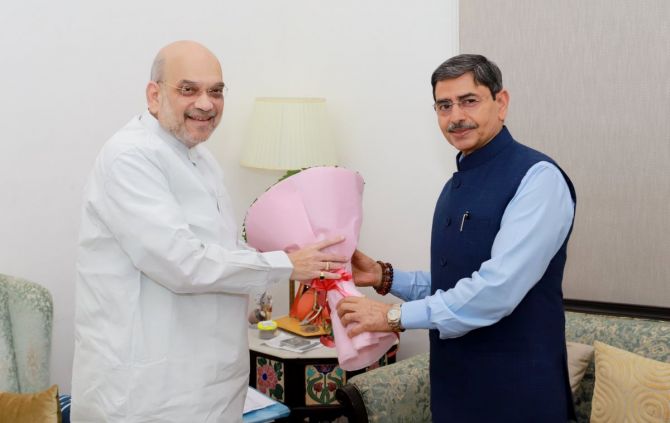
With a division bench of the Supreme Court headed by Chief Justice Dhananjay Yeshwant Chandrachud, on Monday, November 2-0, 2023, asking Tamil Nadu Governor R N Ravi what he was doing on bills that were pending for three years before the court issued notice on the 10th of this month, questions arise as to finding a permanent Constitutional solution to problems of the nature.
That's because, not just from Tamil Nadu, but state governments in Kerala and Punjab, apart from Telangana earlier, had gone all the way up to the apex court with near-similar constitutional grouses.
Likewise, the West Bengal government too has problems with Governor C V Ananda Bose, and is known to be toying with the idea of approaching the Supreme Court.
Given the politics behind it all, one possibility is for binding the governor to act according to the decisions of the state government and clarifying his position vis a vis bills and resolutions passed by the state assembly -- or, re-enacted if returned.
The question remains if given the political realities on the ground, the Supreme Court could pass such directives, or could and would advise Parliament to address the concerns, if any, of the highest judiciary of the land.
Already, there are other sensitive cases like the Mandal Commission case (Indra Sawhney vs Union of India & Others, 1992), setting a 50 per cent upper-limit for all reservations and the S R Bommai case (1994), on the President's powers to dismiss elected state governments and dissolve those state assemblies, without reference to any existing law or Constitutional provision.
Over the past three decades, Parliament has allowed itself and the nation to be guided by the Supreme Court verdicts without legislating on the subject matter, attesting or opposing the same.
One argument is if the Supreme Court verdict pertaining to the President's powers could be valid law even three decades later, the highest judiciary has powers to rule in matters pertaining to state governors, too.
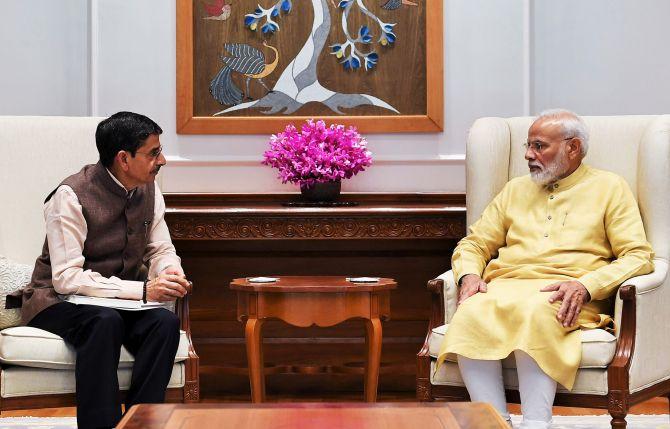
The reasons for seeking judicial/parliamentary law in matters of governor's powers on state legislations and cabinet decisions are not far to seek.
Such Constitutional ambiguity as evidenced in the case of the petitioner-states -- if that is only ambiguity and not political mischief -- had remained in the case of President's powers vis a vis the Union Cabinet and Parliament.
During the Emergency, the government got the President's powers under Article 74 (1) clarified, to ensure that the President did not have any choice in such matters.
Prior to the Forty-Second Amendment, Article 74 (1) read thus: 'There shall be a Council of Ministers with the Prime Minister at the head to aid and advice the President in the exercise of his functions.'
However, there was an ambiguity whether the advice of the council of ministers was binding on the President.
The Forty-second Amendment made it clear and explicit that the President shall 'act in accordance with such advice' -- and he did not have a choice.
Incidentally, the post-Emergency Janata Party government of then prime minister Morarji Desai, even while running down the Forty-Second Amendment, was at best circumspect when it came to restoring the President's powers, to pre-Emergency levels.
Accordingly, the Forty-Fourth Amendment, passed by the Janata government, at best whitewashed the Forty-Second in the matter.
It gave the President, powers to send back the 'advice' of the Cabinet for reconsideration, but just once.
If the council of ministers under the prime minister still returned the same advice, the President did not have a choice in the matter.
He just has to accept it and act accordingly. This amendment came into effect in June 1979.
The question under the prevailing circumstances and political environment is this: If a similar provision can be included, to ensure that governors do not sit on state government's decisions at will, without either accepting them, rejecting, them or returning them.
As the First Bench told Attorney General K Venkataramani, representing Governor Ravi, on Monday, the latter did not have the luxury of 'with-holding' his consent in matters, as he had done while sending back the Bills to the state government last week.
If not earlier, as recently as April 2023, the Supreme Court had clarified the matter when Telangana's government of Chief Minister K Chandrashekhara Rao sought a similar direction to the governor, Dr Tamilisai Soundararajan. Reading the writing on the apex court's wall, the governor obliged without further embarrassment.
Before the apex court's intervention, the Telangana assembly created Constitutional history by opening the customary first session of the calendar year without the governor's address. Barring political protests, neither the governor, nor the pro-governor ruling BJP at the Centre, took it up with either President Draupadi Murmu or the Supreme Court, as would have been the wont. The other two, especially the Centre acting for the President, too did not take any suo motu initiatives.
It now looks as if each one of her counterparts facing petitions in the apex court seem wanting to learn the lesson personally without learning from the other.
It also raises fundamental questions about the kind of legal advice that these governors have been getting from whatever source as may be.
If it's from the legal officers of the Centre, it raises more questions about the credibility and respectability of those offices, like with that of state governors – but without attributing personal prejudices of the gubernatorial kind to those officers.
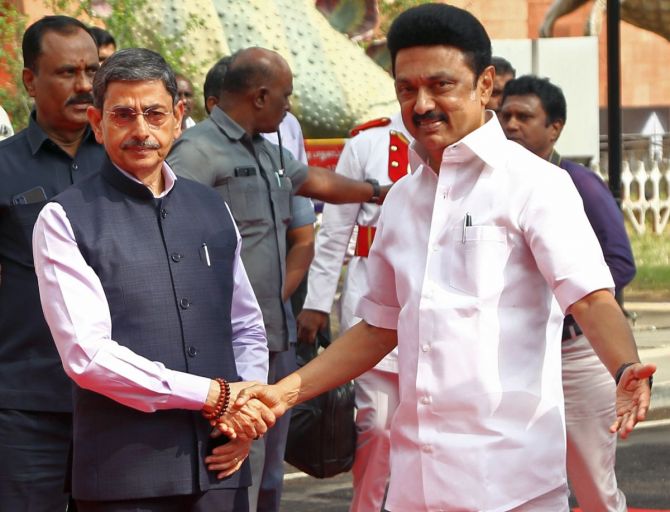
In the Tamil Nadu case, the state government argued before the Supreme Court that the governor's decision to 'withhold' assent to 10 bills, conveyed on November 13, was tantamount to 'returning' the bills.
In the state assembly on November 18, Chief Minister M K Stalin and his cabinet colleagues cited the Centre's submissions in earlier cases of the kind, to argue that the governor 'with-holding' a bill amounted to rejection/return.
Hence, the assembly was well within its powers to re-enact those bills and forward the same to the governor.
It was done before the pending case came up for hearing on Monday morning.
The state government submitted that the Governor, under Article 200, now did not have an option.
Apart from what is regularly appearing in the national media on continual tiff between the Centre-appointed governors and some state governments, an interesting aspect would show up if brought before the Supreme Court during the next hearing.
When the Bench pointed out that the governor was sitting on certain bills since January 2020, AG Venkataramani pointed how the incumbent was in office only from September 2021 -- rather, nearly 20 months later.
As may be recalled, the DMK government of Chief Minister Stalin came to power only in May 2021, six months before Ravi was transferred from Nagaland.
The bills pertaining to 2020 related to the previous AIADMK government of then chief minister Edappadi K Palaniswami. Banwarilal Purohit was the TN governor at the time.
On Ravi's appointment, Purohit was transferred to Punjab.
Already, petitions filed by the Punjab government of AAP Chief Minister Bhagwant Mann too are pending before the Supreme Court.
The facts may be different, but the issues are similar to those pertaining to Tamil Nadu, indicating the prevalence and spread of a certain political mindset, so to say.
From Kerala, the government of CPM Chief Minister Pinarayi Vijayan has moved the apex court with a voluminous petition of its own against Governor Arif Mohammed Khan.
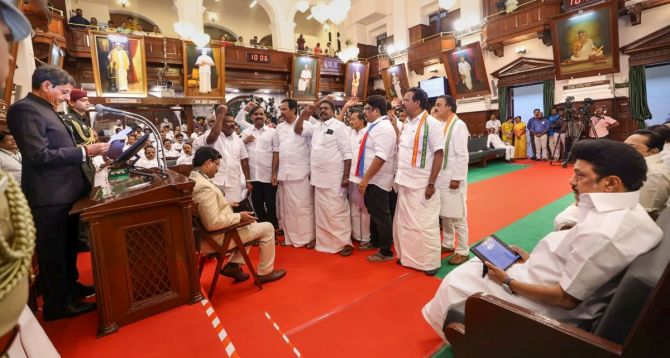
The fact remains that in Prime Minister Narendra Modi's second term, most issues involving governors appointed by the Centre involved state governments run by regional parties, or the CPI-M, which too has been reduced to a regional party.
In Modi's first term, the Opposition charged governors of states, big and small, with making the Raj Bhavan an extension of the ruling BJP's state headquarters.
Possibly owing to the healthy conventions of the higher judiciary in the country, the Supreme Court did not pass any written order on the Tamil Nadu matter.
The judges observed that they would now await Governor Ravi's decision on the 10 bills, re-enacted by the state legislature on Saturday, and posted the case on December 1.
As the court listed out, there are five more bills on which the governor was yet to take/communicate his decision.
Ravi, a constant visitor to New Delhi during his months in the Raj Bhavan, Chennai, flew down to the national capital on Sunday.
The speculation was thus rife about the political and personal options available to him, as the Constitutional limitations on the powers that he had purportedly exercised had reportedly become clear by now.
The apex court proceedings on Monday clarified it, if any clarification was needed.
In between, a few stray wall-posters appeared in some places in the state, asking Ravi to 'Sign or resign'.
Owned up by a lower-level DMK functionary and carrying a picture of Chief Minister Stalin, it deviated from the spirit and purpose of what is considered as a legitimate cause and legal fight of the state government. To say the least, it was in bad taste.
For old-timers, the poster, if one had seen it even if on social media, recalled the Janata Party era (1977-1979), when the likes of Socialist leader and then Union minister George Fernandes forced the Morarji Desai government to order the dismissal of nine state governments, led by the Congress, then in the Opposition.
When then vice president B D Jatti, who had assumed charge as President following the untimely death of incumbent Fakhruddin Ali Ahmed, took his time to decide on the matter in the absence of any precedent in the matter, Fernandes and company staged an indefinite fast outside his official residence, forcing him to yield.
The Supreme Court in its wisdom upheld the dissolution, supporting the government's argument that after the ruling Congress's unprecedented defeat in the post-Emergency Lok Sabha polls, the state governments led by the party too had lost the 'popular mandate'.
This precedent held one more time when Indira Gandhi, after returning to power in the 1980 Lok Sabha polls, dismissed non-Congres state governments, including Tamil Nadu's maiden AIADMK government of then chief minister M G Ramachandran, MGR.
Now, Telangana's Tamizhisai Soundararajan has seemingly defended her Tamil Nadu counterpart -- she is a native of the state and is seen as frequently in Tamil Nadu as much as in the Union territory of Puducherry, where she is the lieutenant governor.
time) withholding state government's decisions and bills passed by the assembly as the Constitution has not fixed any time-frame in the matter. However, she has now advocated better relations between the two Constitutional offices, namely, the governor and chief minister.
Now, a section of the local media, and more so social media, has begun speculating that Ravi, on return to Chennai, even while acting on the legal advice he obtains on the Supreme Court matter, may do other things as well.
Reports claim that he may thus grant 'sanction to prosecute' some state ministers, on the basis of a petition submitted by state BJP president and fellow IPS veteran, K Annamalai.
For now, Governor Ravi has granted sanction for the CBI to prosecute two former AIADMK minister in the multi-crore 'gutka scam'. It came after a 14-month wait. The sanction was shown in the tabulated list that AG Venkatramani presented to the Supreme Court Bench on Monday. What the Supreme Court was not told was that the CBI probe was ordered not by the Tamil Nadu government but by the Madras high court.
N Sathiya Moorthy, veteran journalist and author, is a Chennai-based policy analyst and political commentator.
Feature Presentation: Rajesh Alva/Rediff.com








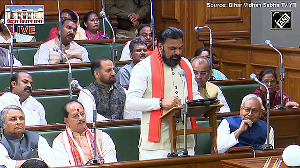

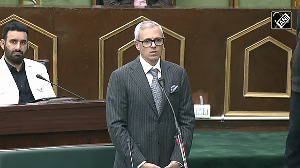
 © 2025
© 2025